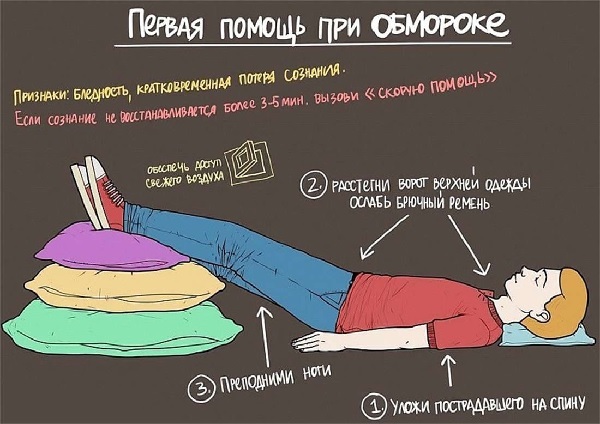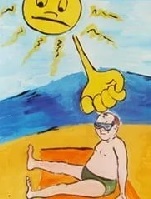Why you can faint and how to provide emergency care
Contents:
- Causes and types of syncope
- Stress, physical pain
- Fug
- Compression of the carotid artery
- hypoglycemia, anemia
- Reflexes
- Varicose veins
- How to help the person?
- Conclusion
 Fainting is a sudden loss of consciousness due to impaired circulation of the head. Why can you faint? There are many reasons for this: severe excitement, loss of blood, being in a stuffy room, pain. What to do if a person has fainted, what are the consequences, is described below.
Fainting is a sudden loss of consciousness due to impaired circulation of the head. Why can you faint? There are many reasons for this: severe excitement, loss of blood, being in a stuffy room, pain. What to do if a person has fainted, what are the consequences, is described below.
Causes and types of syncope
Loss of consciousness is caused by a temporary switch-off of the brain. This occurs when oxygen starvation, stopping blood access to the nervous system. The main reasons why they faint:
- Strong stress.
- Physical pain.
- Lack of air in the room, hot weather.
- Carotid artery compression: games with suffocation "dog kicks", tight collar and clothing.
- Hypoglycemia after insulin administration or during famine.
- Anemia.
- Cough( see Fainting on coughing), swallowing, urination, defecation.
- The presence of varicose veins leads to a tendency to sudden loss of consciousness. Diseases of the heart and respiratory system.
- Some medications( betablockers, nitroglycerin).
 Causes of sudden syncope: manifestations, pre-medical care.
Causes of sudden syncope: manifestations, pre-medical care.
Find out why memory loss occurs in young people: a kind of memory loss.
Types of syncope:
- Vasomotor associated with reduced vascular tone, usually occurs in the heat.
- Vagal, due to irritation of the vagus nerve.
- Cardiac occurs with blockade of the conduction system of the heart, organic pathologies.
- Fainting with open eyes.
Stress, physical pain
Why does strong psychological stress cause loss of consciousness? The reason for this is the increased production of adrenaline and cortisol, which expand the bronchi and increase the frequency, depth of respiratory movements. This leads to hyperventilation, i.e., a decrease in the concentration of uheic acid in the blood and an increase in the partial pressure of oxygen in it.
excess oxygen depresses the respiratory center of the medulla oblongata, and the breath is terminated abruptly, the brain at the same time experiencing a temporary hypoxia - oxygen starvation.
Another mechanism of action of stress is the narrowing of the cerebral vessels from adrenaline. This slows the access of blood to the brain tissue, increases the likelihood of thrombosis due to increased coagulability.
Feeling pain stimulates the release of adrenaline, which constricts blood vessels, increases the need for oxygen, but at the same time blocking its delivery to the brain. Vasovagal reflex happens due to pain, which is caused by irritation of the painful receptors of the urethra when scraping with mucous for analysis.
Fug
lack of oxygen in a hot room leads to loss of consciousness, because the brain is very sensitive to hypoxia. At high temperature, indoor and outdoor air is diluted, and the vessels expand, so the cardiovascular system becomes difficult to maintain adequate blood circulation of the brain. In addition, the sweating intensifies in the heat, and the internal environment becomes viscous.
Compression of the carotid artery
Pinch finger tight collar or terminate the access of oxygen to the brain, causing a short-term and comes off. Atherosclerotic lesion of the carotid artery increases the likelihood of disabling the circulation of the head.
Hypoglycemia, anemia
Lowering the sugar level below the normal level causes first a weakness, and then a loss of consciousness. A low level of glucose does not allow the central nervous system to function, creating an energy deficit. Hypoglycemia arises from hunger or insulin administration.
Anemia is a lack of oxygen delivery - red blood cells. It develops after blood loss, as well as against a deficiency of iron and B vitamins.
Reflexes
When coughing, swallowing and after eating, a person loses consciousness due to irritation of the cranial nerves, usually wandering. Also, when coughing, swallowing, the heart is immediately irritated, close to the lungs and esophagus, involved respectively in coughing and swallowing. Sensitive people have a brain shutdown.
Sometimes a meal that causes blood to flow to the digestive tract is the cause of postprandial hypotension( low blood pressure after eating).This is due to the redistribution of blood.
Varicose veins
The veins of the lower limbs help the heart, pumping blood to it from the legs. With weakness of the venous walls, a return to the heart slows down, the load increases. Therefore, the circulation is disturbed, the whole organism, including the head, receives less oxygen. With varicose veins, disabling the brain usually happens when a person stops( in line), and the muscles of the legs do not help the veins.
How to help a person?
First aid in fainting is based on the restoration of a sufficient flow of blood to the head. To do this, it is necessary to lay the patient's legs so that they are above the level of the heart. What to do next with fainting? It is required to loosen the tight collar, unbuttoning the upper buttons, remove the pressing clothes, ensure the influx of fresh cool air.
 To bring to a conscious state, you can massage the lobes of your ears or give a sniff to a person with ammonia. Emergency fainting treatment may include indirect heart massage, which should be performed by a trained person.
To bring to a conscious state, you can massage the lobes of your ears or give a sniff to a person with ammonia. Emergency fainting treatment may include indirect heart massage, which should be performed by a trained person.
After the victim has come to a conscious state, he needs to give a drink to replenish the volume of circulating blood. It is recommended that sweet tea or tomato juice, the drug Regidron, beverages that provide the body with glucose, mineral salts, moisture.
 Find out what symptoms a person has with a concussion.
Find out what symptoms a person has with a concussion.
All about vasovagal syncope: the main manifestations, diagnosis and treatment.
Read how sunstroke manifests itself: causes and consequences, first aid.
It is necessary to measure the pulse and blood pressure. If the victim does not regain consciousness after the measures taken, he should be taken to a medical facility. This is especially important when suspected of heart disease, usually with the skin of the patient has a pale blue color. But a craniocerebral trauma is possible, in which it is important to put the patient's head on one side, since often a vomiting reflex occurs.
Conclusion
Loss of consciousness may be a sign of serious heart disease. However, more often it is a signal of hunger or lack of air. In case of permanent ailments, it is necessary to consult a doctor to find out the cause.
write the question in the form below:



